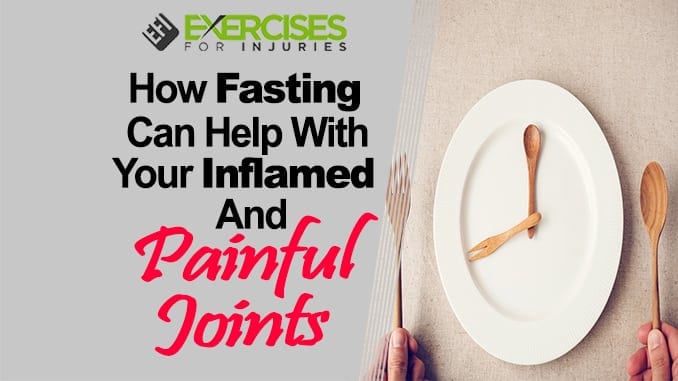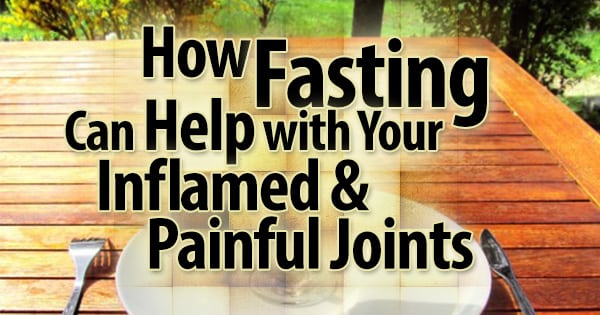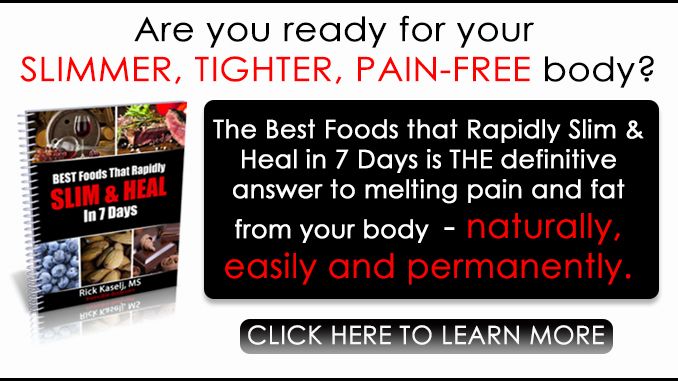Continuous Pain in Right Calf Intermittent Fasting

Today I have a great article on how fasting can have an effect on chronic inflammation.
Have a read and give it a go.
Take it away, James.
Oh, before I go. I met James Gaida in January while I was in Miami. He knew that I help people overcome injuries and pain. He asked me if I recommend people to look at intermittent fasting for pain and injuries. I had said, "no." He said he would write an article on why people should think about it and here we are.
Enjoy the article.
Rick Kaselj, MS
======================
I'm sure you've probably heard about Intermittent Fasting or IF. It's not hard to find articles about it on nearly every fitness or nutrition site on the internet.
I've been a coach in the nutrition and fitness industry for over a decade and IF has been the one thing that I am most excited about. In the words of Kenny Bania (Seinfeld)
"Gold Jerry, Gold!"

My excitement comes from the array of proven benefits, not limited to:
- Fast fat loss
- Improved insulin sensitivity
- Huge spikes in Growth Hormone
- Enhancing brain function
- Reducing cholesterol and blood pressure
Fasting is awesome and insanely effective.
For the EFI reader though there is one more insanely awesome benefit of IF: reducing inflammation.
Inflammation as I'm sure you know, is a necessity to repair any damage in our bodies. Ultimately, inflammation is your body's attempt to protect itself by removing damaged cells and any irritants. It is the beginning of the healing process. After an injury, immediately reducing inflammation isn't always the best course of action. You want some inflammation to induce healing. As the injury heals though you want to be able to control inflammation and reduce as necessary.
Inflammation is a very good thing and a necessity for healing. However, if it is chronic inflammation that causes concern. Chronic inflammation is long term. It occurs when the body is unable to remove the irritant.
It is in your best interest to keep chronic inflammation under control as it has been linked to higher risks of numerous conditions and diseases such as cancer, cardiovascular disease, rheumatoid arthritis and Alzheimer's to name a few.
But chronic inflammation isn't only a result from an acute injury. Chronic inflammation is often a result of our lifestyle factors. Things such as poor dietary decisions (too much sugar and processed food), gut health issues, food intolerance, stress, exhaustion and not enough exercise all play a role in keeping you inflamed.
Score another one for eating better and getting more exercise.
Now, enter Intermittent Fasting.
If you're not aware, Intermittent Fasting is the occasional and intentional skipping of meals in order to put the body in a fasted state, short term. There are many different ways to go about IF but the most popular ways are daily 16 hour fasts (skipping breakfast) or 24 hour fasts (skipping breakfast and lunch) one or two times a week. Most methods come with very similar outcomes so picking one that works best for you is just fine. In a minute I'll let you know how you can get started with IF.

So, back to IF and inflammation:
Numerous studies have shown that Intermittent Fasting is a great tool to help reduce inflammation. There are 2 recent studies in particular that have made the benefits of IF for reducing inflammation abundantly clear.
A study in 2012 and another in 2007 done on people partaking in a month of Ramadan fasting both came to the same conclusions. The researchers compared the subjects taking part in the fasting to a control group eating 3 meals a day.
The studies both found that the individuals that were fasting had significant reductions in inflammation markers interleukin-6, C-reactive protein and homocysteine. In simpler terms, by partaking in fasting they reduced inflammation in their body.
The other important thing to note is that during the studies there was no difference in caloric intake between the individuals fasting and the control group. When the fasting group was free to eat, they consumed as many calories during the day as the group eating three meals a day. This is important to note, as it wasn't calorie restriction reducing inflammation is was the periods of fasting.
It is in your best health interest to get a handle on inflammation. So how can you get started with IF?
- My recommendation for my own nutrition clients is to get started with a 24 hour fast. Pick one day this week where you will be free to go 24 hours without food. Most people will eat dinner the night before, fast throughout the day and have a normal size dinner that night. You may prefer to eat breakfast and then go without food until the next days breakfast. Ultimately the timing doesn't matter, just go 24 hours without calories.
- During the fast it is important to stay hydrated. Try to drink at 2-3 litres of water during the day. Black coffee and green tea (another anti inflammatory) are also permitted. Just make sure you're not getting calories in your beverages.
- Drinking plenty of fluids will also help you curb waves of hunger which will surface and then go away throughout the day. Respond to hunger by taking in more fluids and it will soon pass.
The 24 hour fast is much easier then it sounds and gets even easier the second time around, when you know what to expect. You can partake in one or two 24 hour fasts each week. Don't do any more than two per week.
If you're pregnant or diabetic, fasting in most instances is not right for you. Consult with your doctor before fasting.
To recap, if you are interested in fast fat loss, improved insulin sensitivity, huge spikes in Growth Hormone, enhancing brain function, reducing cholesterol, reducing blood pressure or ridding yourself of chronic inflammation than give Intermittent Fasting a try.
It has made a huge impact in my life over the last couple of years. I am leaner, more energetic and feel healthier then ever. I know it can make a similar impact in your life.
James Gaida Bio:

I am a fat loss expert and certified Nutrition Coach. I have spent more than 13 years coaching clients in both nutrition and fitness. In that time I have also became certified as a Specialist in Performance Nutrition and a Certified Fitness Trainer. I also own many leather bound books and yeah, I'm kind of a big deal!
My baby, 4 Day Fat Loss (4DFL) is dedicated to teaching simple techniques to rapidly burn fat, increase energy and live a healthier life. If you want to find out how to burn fat quickly and transform your body check out the 4DFL Method.

Sources
Ramadan Study 2007: Aksungar F.B. et al. (2007), Interleukin-6, C-Reactive Protein and Biochemical Parameters during Prolonged Intermittent Fasting, Annals of Nutrition and Metabolism, April 2007, 51:88–95
Ramadan Study 2012: Farris MA et al (2012), Intermittent fasting during Ramadan attenuates proinflammatory cytokines and immune cells in healthy subjects, Nutrition Research, December 2012 , 32(12):947-55.
.
Source: https://exercisesforinjuries.com/how-fasting-can-help-with-your-inflamed-and-painful-joints/
0 Response to "Continuous Pain in Right Calf Intermittent Fasting"
Post a Comment